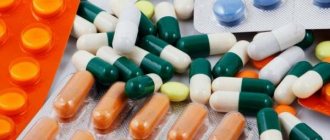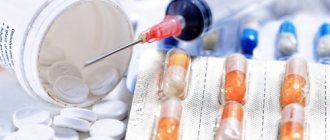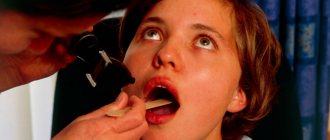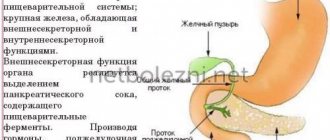Hemorrhoids are a delicate disease that brings significant discomfort to a person. Treatment options for this disease are divided into conservative and surgical, depending on the stage of the lesion. Antibiotics for hemorrhoids are prescribed by a doctor at the acute stage during non-surgical treatment. During the period of remission and calm course of the disease, there is no need for antibacterial agents.
Signs of hemorrhoids
Inflammation of the anal canal is associated with painful symptoms. The anal mucosa swells, bowel movements are difficult, there is blood in the stool, and the temperature increases. The person suffers from severe discomfort, weakness and malaise. For these reasons, a purulent process is possible, which is often aggravated by sepsis and fistulas.
Under no circumstances should you ignore your doctor’s prescription; it is important to follow his recommendations. When prescribing antibiotics, you must carefully follow the dosage and rules of administration. Timely conservative therapy is the key to a favorable cure without surgery to remove cones.
Prevention of inflammatory processes in the intestines
Any drug with complex action has a negative effect on the processes of breakdown of food in the intestines. Correct dosage and adherence to treatment courses can reduce the risk of these disorders.
There are certain measures that can prevent the development of painful manifestations in the intestines:
- Rational, clearly balanced, regular diet. An increase in the preventive effect is observed when high-quality foods are included in the diet.
- Maintaining a healthy lifestyle.
- Prevention of emotional upheavals and stress, which often become triggers for diseases.
- Timely treatment of the initial symptoms of diseases that can affect the gastrointestinal tract.
Maintaining a normal nutritional regimen allows you to minimize the risk of intestinal disease, and maintaining a healthy diet normalizes metabolic processes.
Features of treatment
In many cases, hemorrhoids can be treated well with conservative methods. Local and systemic antibiotics are used to eliminate the inflammatory process, swelling, pain, and normalize blood flow in the vessels. In an advanced stage, it is impossible to do without the intervention of a surgeon. Therefore, to avoid dangerous complications of hemorrhoids, antibiotics are used.
Antibacterial agents have a large group of drugs that favorably cope with pathogenic microorganisms. The action of the drugs prevents the spread of bacteria and infection. They are used in all branches of medicine, including proctology for the treatment of hemorrhoids.
The use of antibiotics for hemorrhoids is prescribed by a specialist after a thorough diagnosis.
Antibiotic therapy will be effective for the following conditions:
- worsening hemorrhoids;
- frequent injury to the intestinal walls with feces;
- cracks in the anus, erosion;
- mechanical damage to the mucous membrane during proctological manipulations;
- tissue necrosis due to insufficient blood circulation;
- purulent fistulas of the colon;
- recovery after surgery to remove hemorrhoids;
- sepsis is a severe complication of hemorrhoids, in which the body tissues are infected with pathogenic bacteria through the blood.
In order to prevent the disease from progressing and to prevent surgical intervention, antibiotics are prescribed for acute forms. They help relieve inflammation, cleanse the pathological area of microbes, and prevent their expansion to the entire rectum and nearby organs. As a result, the acute stage goes away, the mucous membrane is renewed, and the cracks heal.
To determine the shape of hemorrhoids, different diagnostic methods are used: digital examination, colonoscopy, irrigoscopy.
When are antibiotics contraindicated?
The use of these medications is prohibited:
- the period of bearing and feeding the baby;
- autoimmune pathologies;
- infections of viral or fungal etiology;
- insufficient performance of the kidneys or liver;
- spontaneous allergic reactions to the ingredients included in the composition.
Tablets, injections
Treatment of the pathology involves several forms of medications. For internal inflammation of the intestine, tablets and injections are used. Oral use has the highest effectiveness due to the indivisible effect on the microflora and the body as a whole.
Effective antibiotics for internal hemorrhoids are as follows:
- Doxycycline is a tetracycline antibiotic produced in capsules. Used by adults twice a day, 1 piece. The therapeutic course depends on the severity and form of the disease, but not less than 10 days. It is well tolerated by patients, but allergies and dyspeptic symptoms occur occasionally. Cannot be used during pregnancy or lactation.
- Nolitsin - the active substance of the tablets - Norfloxacin. For acute illness, the dose is 1 piece twice a day for 7 days.
- Gentamicin is an antibiotic in the form of a solution for intramuscular and intravenous administration. Used after surgery to prevent infection. The nodes stop thrombosing, the pain disappears, and the wound heals quickly.
- Amoxiclav - capsules act on various types of microbes, are absorbed instantly, the course is prescribed on an individual basis.
- Furazolidone - an antibiotic available in tablet form, has a strong antimicrobial effect, allowing you to instantly stop the inflammatory process, and also has an immunostimulating effect on the body. Take the drug four times a day, 2 tablets, the course is 5-10 days.
- Monural is a remedy for hemorrhoids, in granular form, from which a suspension is made. An antibiotic is prescribed for advanced illness, as well as the presence of prostatitis and urethritis. Shows prolonged action. Take a one-time dose before dinner some time before dinner.
- Detralex - tablets normalize blood circulation and reduce hemorrhoids. For an effective effect, the antibiotic is taken in large dosages.
Other antibiotics also provide excellent results (Levomycetin, Gentamicin, Tetracycline, Erythromycin). Medicines are not taken at the same time as other antibiotics.
For severe pain, lidocaine and novocaine blockades are used, and laxatives (Glycerin suppositories, Duphalac, Normaze) will help normalize stools.
Are there any complications?
The use of penicillin and other antibacterial substances for hemorrhoids often causes negative reactions from the body. Common consequences of taking antibiotics are:
Candidiasis may occur after consumption.
- candidiasis;
- intestinal dysbiosis;
- allergy;
- itching and burning sensations in the anus.
After taking Gentamicin, patients often experience the following side effects:
- attacks of nausea and vomiting;
- increased saliva production;
- kidney failure;
- constant desire to sleep and headaches;
- impaired hearing function, deafness;
- joint pain.
The most dangerous complications occur in patients who treat hemorrhoids with antibiotics for a long time without a doctor’s prescription. In such cases, the following consequences are noted:
- steroid type diabetes mellitus;
- impaired functioning of the adrenal glands;
- increased sweating;
- bleeding from the gastrointestinal tract.
Gels, ointments, suppositories
Hemorrhoids can be cured with suppositories and ointments that are suitable for all stages of hemorrhoids. They have great effectiveness due to the targeted effect in the pathological area. Antibiotics help relieve pain and disinfect the intestinal mucosa.
Effective ointments and suppositories for relieving inflammation of the veins are:
- Proctosedyl - ointments and suppositories reduce the symptoms of acute hemorrhoids and prevent infection. They have a wide spectrum of action, have a strong anti-allergenic effect, and eliminate itching. Suitable for treating internal and external cones. The ointment is applied to the affected area or introduced into the rectum using an applicator. Suppositories are used after bowel movements 2 times a day for a week. Contraindicated in case of illness in pregnant women and during lactation.
- Gepatrombin G - is produced in the form of ointments and suppositories. Prescribed for acute and chronic hemorrhoids. At the time of exacerbation, such medications and suppositories are used twice a day.
- Levomekol - ointment suitable for external inflammation in the anus, fissures. The active component chloramphenicol has a bacteriostatic result. Kills pathogenic organisms, quickly heals wounds. The product is applied to gauze, applied to the sore spot, change this compress daily. The therapeutic course of antibiotic is 10 days.
- Troxerutin is a cream-gel product that prevents the development of inflammatory processes. The gel can be used as rubbing, compresses, or internal administration.
It is important to know how to use suppositories correctly so as not to damage the intestinal mucosa. They should be inserted carefully, after lubricating the anus with Vaseline.
Traditional methods are also used to treat hemorrhoids. Sitz baths with the addition of medicinal plants to the water (St. John's wort, chamomile, calendula, string) help well; they have an anti-inflammatory, antimicrobial effect, and will help prevent anal infections.
Methodology of disease therapy
You cannot try to heal the disease at home using traditional methods. The disease is not dangerous. In extreme situations, it can cause harm to health and take life. The therapy methodology is different; the decision on how to treat a patient is up to an experienced doctor. After analyzing the circumstances, the doctor will decide on measures taken to relieve the patient from suffering. This is a medical or surgical treatment.
Hemorrhoid removal
Medication method
A conservative method of treating hemorrhoids involves treatment with analgesics and antibiotics. Treatment with medications brings relief to the patient and helps relieve painful symptoms. If everything is done correctly, there is a chance of complete recovery from the disease.
The problem is characterized by the tendency of the acute course of the disease to turn into a chronic disease. The chronic type requires long-term therapeutic measures. Medicines are being selected for administration in unlimited quantities.
Operative method
Treatment of hemorrhoids with surgery is the last measure of therapy, carried out with the consent of the patient.
A lot of reasons with logical and scientific justification provoke the doctor to advise the patient to undergo surgical treatment, which involves complete excision of hemorrhoidal cones. The best time for surgical intervention is the period of the non-acute phase of the disease. First, drug treatment is prescribed - surgical intervention during the acute period increases the risk of negative results. Hemorrhoids after antibiotics can be easily treated surgically and have fewer complications.
The operation is performed in the following cases:
- A disease that has an advanced form.
- Necrosis of tissue structures.
- Development of all kinds of complications.
Surgical intervention is prescribed during the chronic course of the disease. The need for intervention is indicated by: severe bleeding, hemorrhoidal cones coming out.
The situation is complicated by the lack of ability to carry out proper hygiene procedures. In order to prevent the development of adverse reactions, surgical treatment is supplemented with antibiotics. Reduce inflammation and pus formation. Postoperative drug therapy lasts on average three to ten days.
Side effects
What antibiotics to take for hemorrhoids is determined by a specialist. Independent or uncontrolled use can lead to side effects:
- dysbacteriosis;
- allergic reactions;
- if you do not take drugs that protect the mucous membrane in parallel, nausea, diarrhea, and vomiting are possible;
- long-term use leads to the addiction of antibiotic bacteria;
- candidiasis;
- dizziness;
- joint pain;
- insomnia or, on the contrary, drowsiness;
- Quincke's edema;
- secondary infection.
Such reactions after antibiotics appear due to individual intolerance to the constituent substances or overdose. If at least one negative sign occurs, you need to stop taking the medication and notify your doctor.
When treating hemorrhoids with antibiotics, one should not forget about the use of probiotics (Bifidumbacterin, Baktistatin, Probifor), which help improve the intestinal microflora. It is also important to organize proper nutrition during therapeutic measures to prevent constipation. Gymnastics, swimming in the pool, and walking are effective as additional treatment.
We recommend: How to properly dilute and take baths for hemorrhoids with potassium permanganate
After removing nodes
After hemorrhoid removal, the patient may be prescribed a course of medications to prevent inflammation. Usually, capsules or suspensions are prescribed, which must be taken strictly according to the proposed regimen.
Drugs that prevent inflammation in hemorrhoids
With minimally invasive techniques, antibiotics may not be used, but with classic hemorrhoidectomy using a scalpel or laser, it is necessary.
The correct choice of drug helps speed up wound healing and shortens the rehabilitation period.
The prophylactic course is prescribed immediately after surgery and lasts at least 5 days. It must be accompanied by a gentle diet; if necessary, the patient receives painkillers.
Effective drugs
Among the most popular and effective drugs for the treatment of hemorrhoids are:
The medicine is used both in the treatment of the acute phase of the disease and in the remission stage of the disease. The drug can be used as maintenance therapy, so there are practically no restrictions on the timing of its administration.
The medicine itself helps cope with symptoms such as:
- inflammation;
- swelling;
- the occurrence of blood clots;
- unpleasant itching;
- painful sensations.











